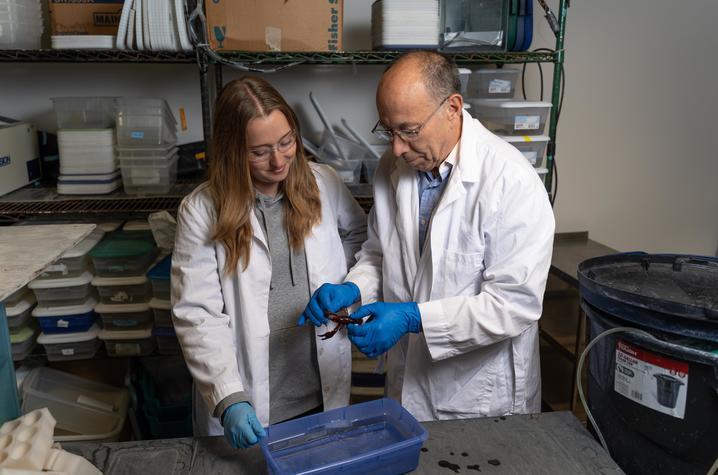AppalachiaCorps Internship Program continues in Summer 2025
LEXINGTON, Ky. (Feb. 3, 2025) — The University of Kentucky Appalachian Center will continue AppalachiaCorps, a student internship program, for Summer 2025.
AppalachiaCorps pairs students with experiential learning experiences in Eastern Kentucky and the greater Appalachian region. The internship offers students the opportunity to network and prepare for future careers.
UK Arts and Sciences student mixes medicine and music
By Cassady Brockman

UK’s Walker, Wilkinson inducted into Kentucky Writers Hall of Fame
LEXINGTON, Ky. (Feb. 3, 2025) — Three writers and educators with ties to the University of Kentucky will be inducted into the Kentucky Writers Hall of Fame.
Campus community invited to honor Black History Month with calendar of events
By Ryan Girves
LEXINGTON, Ky. (Jan. 31, 2025) – This February, the University of Kentucky Martin Luther King Center, along with partners across campus, will celebrate Black History Month with a series of events and programs throughout the month. The events are open to the UK community and the public.
UK Visiting Writers Series

Tania James is an associate professor of English in the MFA program at George Mason University. She is the author of four works of fiction, all published by Knopf:
- "The Tusk That Did the Damage," which was a finalist for the International Dylan Thomas Prize and the Financial Times Oppenheimer Award.
- "Aerogrammes and Other Stories," which was named a Best Book of 2012 by Kirkus Reviews, Library Journal and The San Francisco Chronicle.
- "Atlas of Unknowns," which was a New York Times Editor’s Choice and a finalist for the DSC Prize for South Asian Literature.
- "Loot," which was published by Knopf Doubleday in 2023 and longlisted for the National Book Award for fiction
Her short stories have appeared in Freeman’s: The Future of New Writing; Granta; The New Yorker; O, The Oprah Magazine; and One Story, among other places, and featured on Symphony Space Selected Shorts. She has received fellowships from the MacDowell Colony, Ragdale, the Sustainable Arts Foundation and the Fulbright Program.
POSTPONED: UK Visiting Writers Series

POSTPONED
Kiese Laymon is the Libbie Shearn Moody Professor of English and Creative Writing at Rice University. Laymon is the author of "Long Division," which won the 2022 NAACP Image Award for fiction, and the essay collection "How to Slowly Kill Yourself and Others in America," named a notable book of 2021 by the New York Times.
Laymon’s bestselling "Heavy: An American Memoir," won the Andrew Carnegie Medal for Excellence in Nonfiction, the Christopher Isherwood Prize for Autobiographical Prose, the Barnes and Noble Discovery Award and the Austen Riggs Erikson Prize for Excellence in Mental Health Media. It was named one of the 50 Best Memoirs of the Past 50 Years by The New York Times. The audiobook, read by the author, was named the Audible 2018 Audiobook of the Year.
Laymon is the recipient of 2020-2021 Radcliffe Fellowship at Harvard. Laymon is at work on the books "Good God" and "City Summer, Country Summer" and a number of other film and television projects. He is the founder of The Catherine Coleman Literary Arts and Justice Initiative, a program based out of the Margaret Walker Center at Jackson State University. The program helps young people in Jackson grow more comfortable with reading, writing, revising and sharing their work. He is the co-host of Reckon True Stories with Deesha Philyaw. Kiese Laymon was awarded a MacArthur Fellowship in 2022.
UK Visiting Writers Series welcomes two authors
LEXINGTON, Ky. -- The University of Kentucky’s Creative Writing Division in the English Department in the College of Arts and Sciences will host two nationally recognized writers as part of the UK Visiting Writers Series this spring semester.
The first event will be at 6 p.m. Wednesday, Feb.19, at the Singletary Center for the Arts Recital Hall. The featured reader is Kiese Laymon. The event is free and open to the public.
UK-led study points to possible genetic explanation for regeneration
LEXINGTON, Ky. (Jan. 27, 2025) — Research conducted by an international team led by biologists at the University of Kentucky has found that the ability to regenerate complex tissue may be more widespread in mammals than previously thought — an important step toward figuring out why many most mammals, and humans in particular, have poor regenerative ability.


